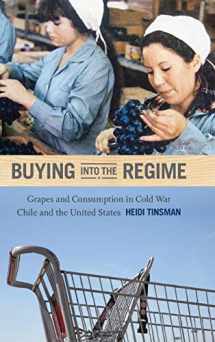
Buying into the Regime: Grapes and Consumption in Cold War Chile and the United States (American Encounters/Global Interactions)
ISBN-13:
9780822355205
ISBN-10:
0822355205
Edition:
Illustrated
Author:
Heidi Tinsman
Publication date:
2014
Publisher:
Duke University Press Books
Format:
Hardcover
376 pages
FREE US shipping
Book details
ISBN-13:
9780822355205
ISBN-10:
0822355205
Edition:
Illustrated
Author:
Heidi Tinsman
Publication date:
2014
Publisher:
Duke University Press Books
Format:
Hardcover
376 pages
Summary
Buying into the Regime: Grapes and Consumption in Cold War Chile and the United States (American Encounters/Global Interactions) (ISBN-13: 9780822355205 and ISBN-10: 0822355205), written by authors
Heidi Tinsman, was published by Duke University Press Books in 2014.
With an overall rating of 4.2 stars, it's a notable title among other
books. You can easily purchase or rent Buying into the Regime: Grapes and Consumption in Cold War Chile and the United States (American Encounters/Global Interactions) (Hardcover) from BooksRun,
along with many other new and used
books
and textbooks.
And, if you're looking to sell your copy, our current buyback offer is $0.3.
Description
Buying into the Regime is a transnational history of how Chilean grapes created new forms of consumption and labor politics in both the United States and Chile. After seizing power in 1973, Augusto Pinochet embraced neoliberalism, transforming Chile’s economy. The country became the world's leading grape exporter. Heidi Tinsman traces the rise of Chile's fruit industry, examining how income from grape production enabled fruit workers, many of whom were women, to buy the commodities—appliances, clothing, cosmetics—flowing into Chile, and how this new consumerism influenced gender relations, as well as pro-democracy movements. Back in the United States, Chilean and U.S. businessmen aggressively marketed grapes as a wholesome snack. At the same time, the United Farm Workers and Chilean solidarity activists led parallel boycotts highlighting the use of pesticides and exploitation of labor in grape production. By the early-twenty-first century, Americans may have been better informed, but they were eating more grapes than ever.


We would LOVE it if you could help us and other readers by reviewing the book
Book review

Congratulations! We have received your book review.
{user}
{createdAt}
by {truncated_author}


